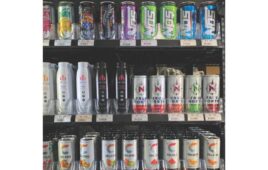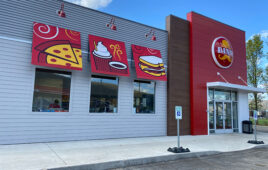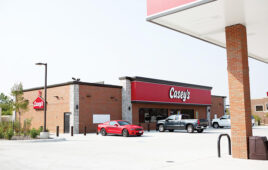 The retail industry’s annual gathering, now known as “NRF Retail Week,” or “Retail’s BIG Show,” is centered around the three-day conference at the Jacob Javits Convention Center in New York City.
The retail industry’s annual gathering, now known as “NRF Retail Week,” or “Retail’s BIG Show,” is centered around the three-day conference at the Jacob Javits Convention Center in New York City.
Of the 800 exhibitors and over 150 sessions, we spent three full days at the Javits and found no shortage of convenience-centric topics and vendors to write about.
Sustainability
I noted six sessions with the word “sustainability” in their headlines and session descriptions. Clearly, sustainability is firmly at the top of every retailer’s agenda.
Seth Goldman, executive chair of Beyond Meat, told me after his session with Phil Lempert, the editor of SupermarketGuru.com (“A burger with benefits — From Beyond”) that the sustainability aspects of plant-based meat are a big factor driving the rapid adoption among college students.
Since college students are a significant customer base for c-stores, I asked him about plant-based products in c-stores, and he told me the Sheetz chain-wide rollout (first in the U.S.) of the Beyond Burger, announced in mid-December was doing really well, and he teased that he expects other chains to start testing Beyond products.
He also shared that they expect the Beyond Sausage Breakfast Sandwiches, launched earlier this year, to become a very popular offering in c-stores. According to a thread on Reddit, r/vegan, the Wawa chain has been testing a Beyond meat product in some east coast stores: https://www.reddit.com/r/vegan/comments/dda71a/found_beyond_meat_at_my_local_wawa/
Food Waste
Part of the value built into such a broad-spectrum, industry-spanning event like NRF’s BIG Show is the cross-category learnings and knowledge transfer that takes place.
Food waste is a growing concern in the grocery space, and while food waste is currently more-or-less accepted in the convenience store category as a “necessary expense” in order to run fresh and grab-and-go programs, one vendor, ADC, whose booth display boasted logos of grocery chains as customers, says this will soon change.
“As the lines delineating grocery and convenience blur on their fresh food offerings, the convenience category is realizing these profit-killing inefficiencies around food waste are not sustainable if they hope to compete with grocery and QSR for the same customers,” said Jesus Mathus, Global Head of Retail Solutions.
ADC takes its considerable experience providing end-to-end visibility and management tools that help its grocery clients reduce production waste in their fresh food departments (bakery, deli, seafood, etc.) to the to the c-store space, where the company has several pilot programs of their new cloud platform with large chains running.
Cash-Handling
Payments is a fairly prominent retail topic; however, for the mall stores, big-box and brand concepts (those that send the majority of attendees to NRF), it’s safe to say that the cash-handling aspect of payments isn’t at the forefront of their agenda. That’s why the Suzo Happ booth display caught our attention.
According to Nathan Paredes, VP of Digital Systems, the company (well-known for their cash dispensing and accepting machines in the casino and amusement categories) developed this solution for the fuel and c-store category because “the cash-paying gas customer is demanding the same quickness and convenience that card-paying customers benefit from with pay-at-the-pump solutions.”
 The CashComplete interface (pictured) is a cloud-based solution built over a cash-accepting device designed to let gas customers skip the line at the cashier and pay with cash inside the store.
The CashComplete interface (pictured) is a cloud-based solution built over a cash-accepting device designed to let gas customers skip the line at the cashier and pay with cash inside the store.
GK Software also displayed a fuel pump at its booth. According to Jean Cole, Senior Product Manager, “C-store chains are demanding point-of-sale (POS) platforms that enable frictionless mobile checkout, which represents a stellar market opportunity for non-legacy vendor partners that provide robust, scalable and flexible POS solutions.”
Managing the Labor Force
Ever-rising labor costs and the lowest unemployment rates in decades is driving retailers to adopt technology that automates all manner of retail tasks, including artificial intelligence (AI)
Gary Saarenvirta, founder and CEO of Daisy Intelligence, spoke at the session “AI: The challenges, benefits, and opportunities for retailers” with Alisha Tarrance, Merchandise Financial Planning Manager, SpartanNash.
Gary commented during the presentation that “AI doesn’t replace humans; it augments human decision-making.”
Labor scheduling for a chain of stores is one task that humans may eagerly relinquish to the forces of automation. Amanda Nichols, senior manager, retail, hospitality, and food service practice at Kronos Incorporated, discussed how Kum & Go deployed a cloud-based workforce management solution that reduced manager scheduling time from one hour weekly to five to 10 minutes.
“Everything that we try to do is to make these employees lives and their managers lives easier,” she said. “So that’s where a lot of these automated tools come into play. This is how we view machine learning and artificial intelligence. Like, how can we use it to make scheduling easier on the employee? How can we make it easier on the store manager?”
Kevin Sterneckert, chief marketing officer at Symphony RetailAI, spoke with us after a session with SpartanNash and Dollar General, “Going from hype to hyper-performance with AI demand forecasting.”
According to Sterneckert, c-stores are “particularly positioned to benefit from demand forecasting powered by AI,” because the “category’s demand is especially impacted by external influences such as temperature and weather.”
Dave Hochman is a frequent contributor to several publications, is the founder of DJH Marketing Communications Inc., a PR and marketing consultancy with strong specialization in the retail economy. NRF 2020 marks his 17th year covering the event. Follow Dave on Twitter @davehochman




